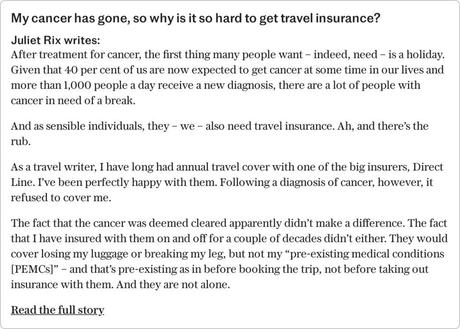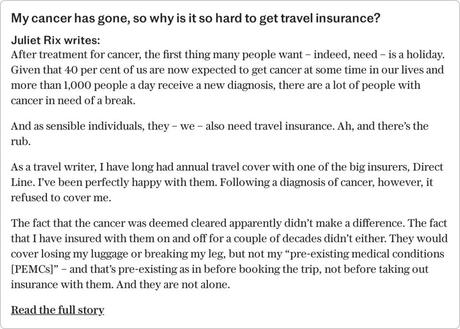
There are benefits to being an older traveler, including free or reduced-price admission to many sights and attractions in Europe. But there are also disadvantages. Particularly the significantly higher prices associated with purchasing travel insurance and the steep increases for pre-existing medical conditions.
We are not just talking about travelers over 60 or 65 years old. Above the age of 40 there is a sharp increase and from that moment on the premiums can increase every 10 or even five years. But once you turn 65, some companies will no longer insure you at all. And when they do, premiums usually double again, then continue to rise as you age past 70.
For example, the cost of Columbus Direct's Silver Single Trip policy, which covers a week's holiday in France, increases as follows:
These increases and cutoffs, despite the fact that older travelers are wiser and more experienced, are certainly much less likely to land them in the hospital after falling off a balcony or diving into the shallow end after drinking too much sangria. The standard response from insurers is that the higher premiums reflect an increased risk of other types of medical claims, which are also among the most expensive to settle. Older people, they say, get sick more often, are more prone to various types of accidents, require longer hospital stays and are more expensive to treat.
They ignore the fact that some over-60s (or even over-80s) are fitter than many much younger travelers. They only look at averages, and want to make sure they win both ways: an insurer won't offer you a discount because you're fit, but if you have a pre-existing illness or health condition, chances are - if they're willing reimburse you at all - they will charge you even more, and will likely exclude treatment related to that disease or condition.
One problem with comparing premiums is that no two travel insurance policies offer exactly the same coverage levels or terms. The best policy for you may not be the cheapest overall; it will be the one that gives you enough coverage at the best price. So there is no shortcut to review the coverage overview and check whether you are happy with the amounts offered.
The story continues
Here are some tips for finding more affordable coverage for older travelers.
1. Find a specialized insurer
This is a selection of companies that offer coverage to people aged 65 and over.
-
All Clear Insurance (0330 173 4544; allcleartravel.co.uk) offers cover for "all ages", "all destinations" and "all conditions".
-
Avanti Travel Insurance (0330 822 4448 avantitravelinsurance.co.uk) has no maximum age for single or multi-trip policies. Annual policies have travel duration restrictions depending on age and destination.
-
Flexicover (0333 005 1071; flexicover.co.uk) offers single trip cover for all ages and annual multi-trip insurance up to age 85.
-
Holidaysafe Insurance (0333 005 1062; holidaysafe.co.uk) has no maximum age for single trips and 79 for the annual policy (although this may depend on the destination).
-
Insurancewith (0333 005 1066; Insurancewith.com) offers no upper age limit for single trip policies, and a maximum age limit of 85 for multiple trip policies.
-
JD Travel Insurance (0344 247 4749; jdtravelinsurance.co.uk) can arrange insurance with no age limit for single and annual multi-trip policies.
-
PJ Hayman (02392 419080; freespirittravelinsurance.com) does not set an upper age limit for single or multiple cover.
-
Columbus Direct (0800 0680 060; columbusdirect.com) offers single trip cover up to age 85, annual coverage up to age 74.
-
Saga (0800 056 9200; saga.co.uk) says the policyholder must be over 50, but up to nine family members and friends of any age can be added. There is no upper age limit.
-
Staysure (0330 828 6371; staysure.co.uk) has no upper age limit for a single or annual multi-trip policy.
-
World First (0345 908 0161; world-first.co.uk) covers people up to 100 for a single trip, and up to 79 with annual cover.
2. Buy a multi-trip policy
If you travel four or five times a year or more, it's probably cheaper to take out an annual 'multi-trip' policy, which reimburses you for all the trips you take that year. Unfortunately, the maximum age limits for these types of policies are usually significantly lower than for policies that cover one-way trips (see above).
3. Cut the cover
Many policies are now flexible. You can cancel certain coverage, for example lost or stolen luggage, and thereby reduce the premium.
4. Explain health problems
This is what worries insurers the most. If you become ill due to a condition that you did not declare when you took out the insurance, your claim will not be paid. Even if you have an annual policy, you must inform the insurer if you develop a condition during the term of the insurance. Typical conditions may include high blood pressure, diabetes or cancer, even in remission, but if you are unsure, contact the company before purchasing cover, and have all the details in writing. Your premium may not increase much and the insurer may not be concerned about it. On the other hand, this may result in a specific exclusion from treatment, or coverage may be denied.
However, if you are having trouble finding such cover, some of the insurers mentioned above specialize in these types of problems. Try: Avanti Travel Insurance; All clear insurance; Insurance with; JD Travel Insurance; P.J. Hayman; Staysure and world first.


5. Monitor activities
If you want to stay active during your vacation, check what activities are/are not included, otherwise you could find yourself without coverage and an expensive hospital bill.
6. Check Covid coverage
Covid-19 has brought a whole new dimension to the risks of having to cancel or change your holiday. Check what is covered. No insurance will cover your costs if you unilaterally decide to cancel your holiday, but most do offer cancellation cover in case you test positive in the 14 days prior to your trip or if you have to shorten your trip due to a positive test result abroad as default. Others offer "comprehensive" Covid-19 cover as standard, which may also allow you to cancel or shorten a trip due to hospitalization or death of a member of your household due to Covid-19. For more information, see our guide to Covid coverage.
This article was first published in June 2023 and has been revised and updated. Reader Service: Learn how you can get travel insurance for people over 70 with the Travel insurance service of Telegraph Media Group.